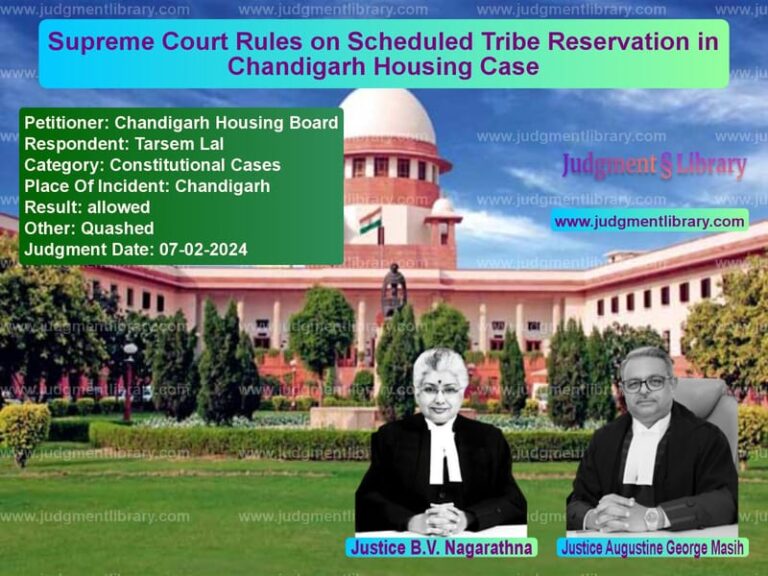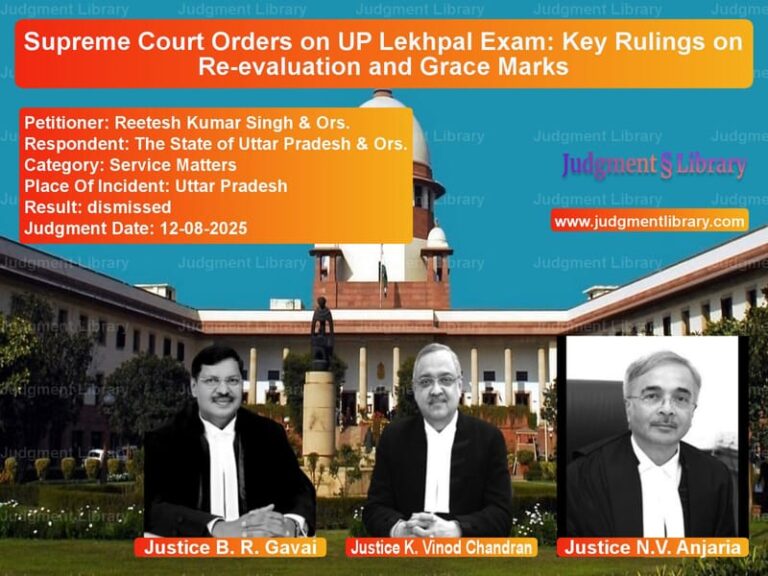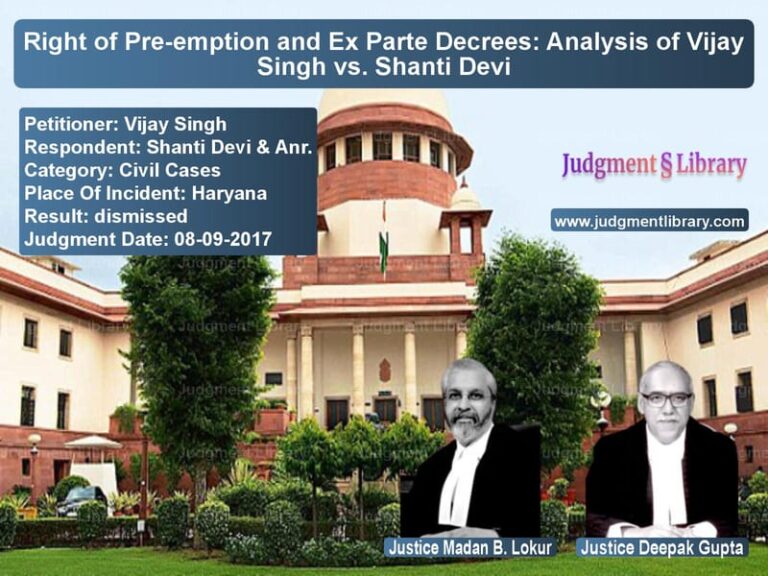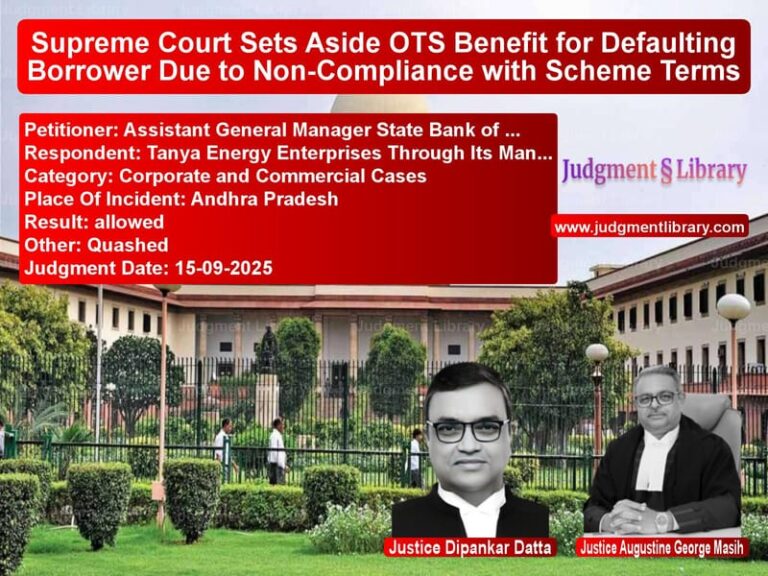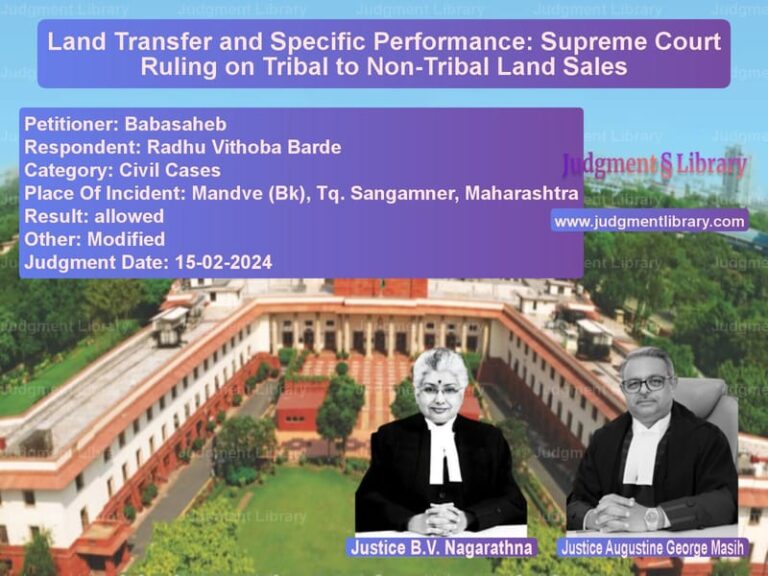Supreme Court Upholds Discharge of Probationary Constable for Prolonged Absence
The Supreme Court of India recently upheld the discharge of a probationary constable in The State of Punjab & Ors. v. Jaswant Singh, setting an important precedent on the scope of Rule 12.21 of the Punjab Police Rules, 1934. The Court ruled that a probationary constable may be discharged if found unlikely to become an efficient police officer, emphasizing that such orders are not punitive but administrative decisions.
Background of the Case
The case originated when the respondent, Jaswant Singh, was appointed as a constable in the Punjab Police on probation. While undergoing training at the Police Recruits Training Centre, he was sent for special duty as a security guard in Amritsar. After completing the assignment, he failed to report back to the Training Centre and remained absent without intimation.
The Superintendent of Police (SP) of the Training Centre reported his absence to the Senior Superintendent of Police (SSP), Amritsar, recommending his discharge under Rule 12.21 of the Punjab Police Rules, 1934. The SSP, agreeing with the recommendation, discharged Jaswant Singh from service on March 28, 1991, treating his absence period as non-duty, non-pay.
Challenging this order, the respondent filed a civil suit, arguing that his discharge was illegal and violated principles of natural justice. The Trial Court ruled in his favor, deeming the discharge illegal and directing the authorities to rectify procedural irregularities. The respondent further appealed for reinstatement with all service benefits, which was granted by the First Appellate Court and later affirmed by the Punjab & Haryana High Court. The State of Punjab then approached the Supreme Court.
Key Legal Issues Before the Supreme Court
- Whether the discharge of the probationary constable under Rule 12.21 of the Punjab Police Rules was legal.
- Whether the order of discharge was punitive or a termination simpliciter.
- Whether principles of natural justice were violated.
Arguments by the Appellants (State of Punjab)
The State of Punjab contended:
- Jaswant Singh was a probationer and had no vested right to continue in service.
- His prolonged absence without intimation reflected irresponsibility, justifying his discharge.
- The order of discharge was passed in accordance with Rule 12.21, which allows the discharge of probationary constables found unlikely to become efficient police officers.
- The decision was based on an administrative assessment, not misconduct, and hence did not require an inquiry.
Arguments by the Respondent
The respondent countered:
- The discharge was punitive in nature and required a departmental inquiry.
- He had medical reasons for his absence but was not given an opportunity to explain.
- The authorities failed to follow principles of natural justice.
- The High Court was correct in ordering his reinstatement with full benefits.
Supreme Court’s Analysis
1. Scope of Rule 12.21 of the Punjab Police Rules
The Court emphasized that Rule 12.21 grants the SSP authority to discharge a probationary constable within three years if he is found unlikely to become an efficient police officer. Citing State of Punjab v. Sukhwinder Singh (2005), the Court reiterated:
“A probationer has no right to continue in service if found unsuitable. The discharge under Rule 12.21 is an administrative function, not a disciplinary action.”
2. Nature of Discharge Order: Punitive or Administrative?
The Court examined whether the order was punitive or termination simpliciter. Referring to State of Punjab v. Balbir Singh (2004), it held:
“A termination order is punitive if it is based on an allegation of misconduct. In this case, the order merely stated that the respondent was not likely to become an efficient officer, without casting any stigma.”
Thus, it concluded that the discharge was not a punishment but an administrative decision.
3. Principles of Natural Justice
The Court observed that the requirement of natural justice depends on the nature of the order. Since the discharge was based on administrative assessment rather than misconduct, no formal inquiry was needed. The judgment stated:
“Natural justice principles are not required when the discharge is based on suitability assessment rather than misconduct findings.”
Supreme Court’s Judgment
The Supreme Court allowed the appeal, setting aside the judgments of the lower courts. The key directions were:
- The order of discharge was upheld as valid.
- The respondent’s suit was dismissed.
- No costs were imposed on either party.
The Court concluded:
“The High Court and lower courts misconstrued Rule 12.21. The discharge was an administrative action, not a punitive termination.”
Implications of the Judgment
This ruling has significant implications:
- Clarification on Probationary Discharges: The decision confirms that probationers can be discharged without an inquiry if found unsuitable.
- Judicial Deference to Administrative Decisions: The Court reaffirmed that assessments of efficiency by supervisory officers will not be interfered with lightly.
- Limits on Natural Justice in Suitability Assessments: It clarifies that due process requirements vary based on the nature of termination.
Conclusion
The Supreme Court’s ruling in The State of Punjab & Ors. v. Jaswant Singh upholds the discretion of authorities in assessing probationary officers. By distinguishing between administrative discharge and punitive termination, the judgment ensures that probation rules are applied consistently while protecting the integrity of the police force.
Petitioner Name: The State of Punjab & Ors..Respondent Name: Jaswant Singh.Judgment By: Justice J.K. Maheshwari, Justice K.V. Viswanathan.Place Of Incident: Amritsar, Punjab.Judgment Date: 05-09-2023.
Don’t miss out on the full details! Download the complete judgment in PDF format below and gain valuable insights instantly!
Download Judgment: the-state-of-punjab-vs-jaswant-singh-supreme-court-of-india-judgment-dated-05-09-2023.pdf
Directly Download Judgment: Directly download this Judgment
See all petitions in Termination Cases
See all petitions in Public Sector Employees
See all petitions in Disciplinary Proceedings
See all petitions in Judgment by J.K. Maheshwari
See all petitions in Judgment by K.V. Viswanathan
See all petitions in allowed
See all petitions in supreme court of India judgments September 2023
See all petitions in 2023 judgments
See all posts in Service Matters Category
See all allowed petitions in Service Matters Category
See all Dismissed petitions in Service Matters Category
See all partially allowed petitions in Service Matters Category


